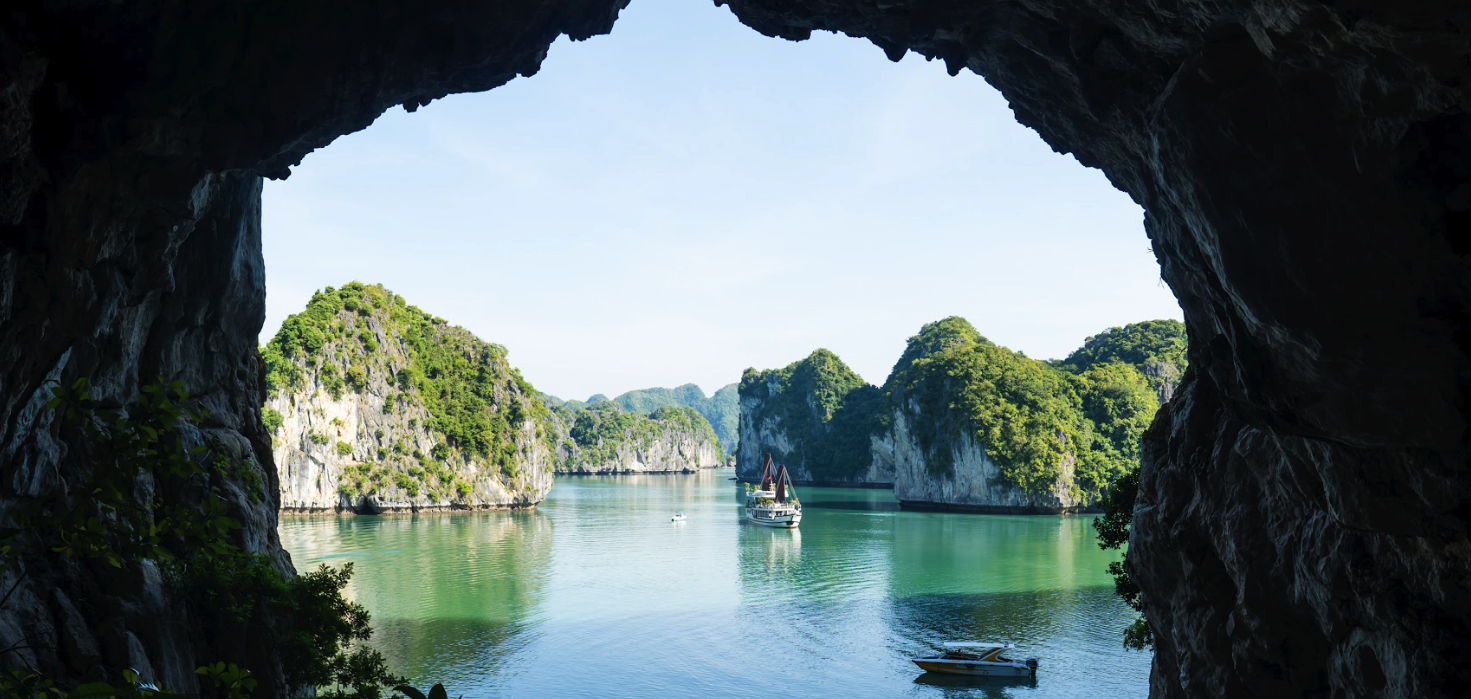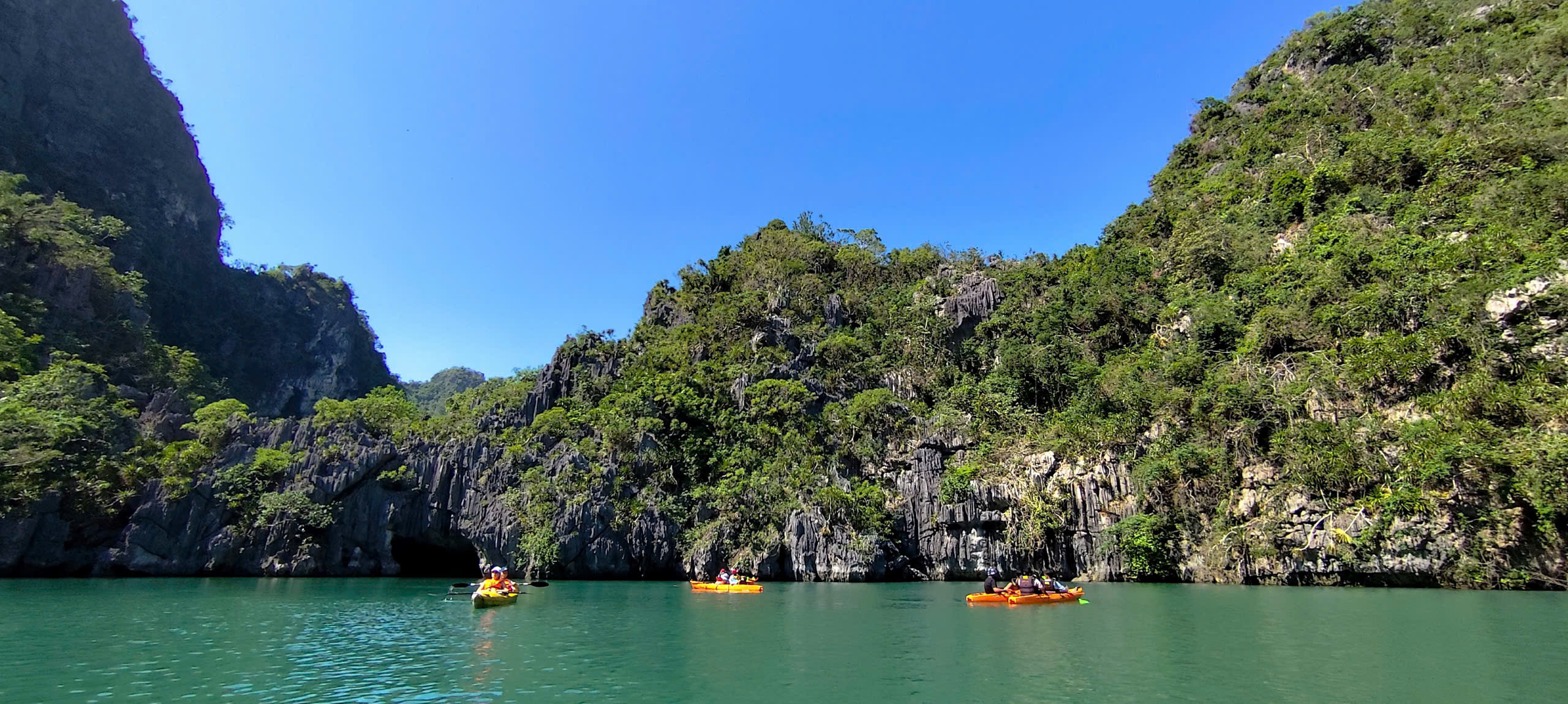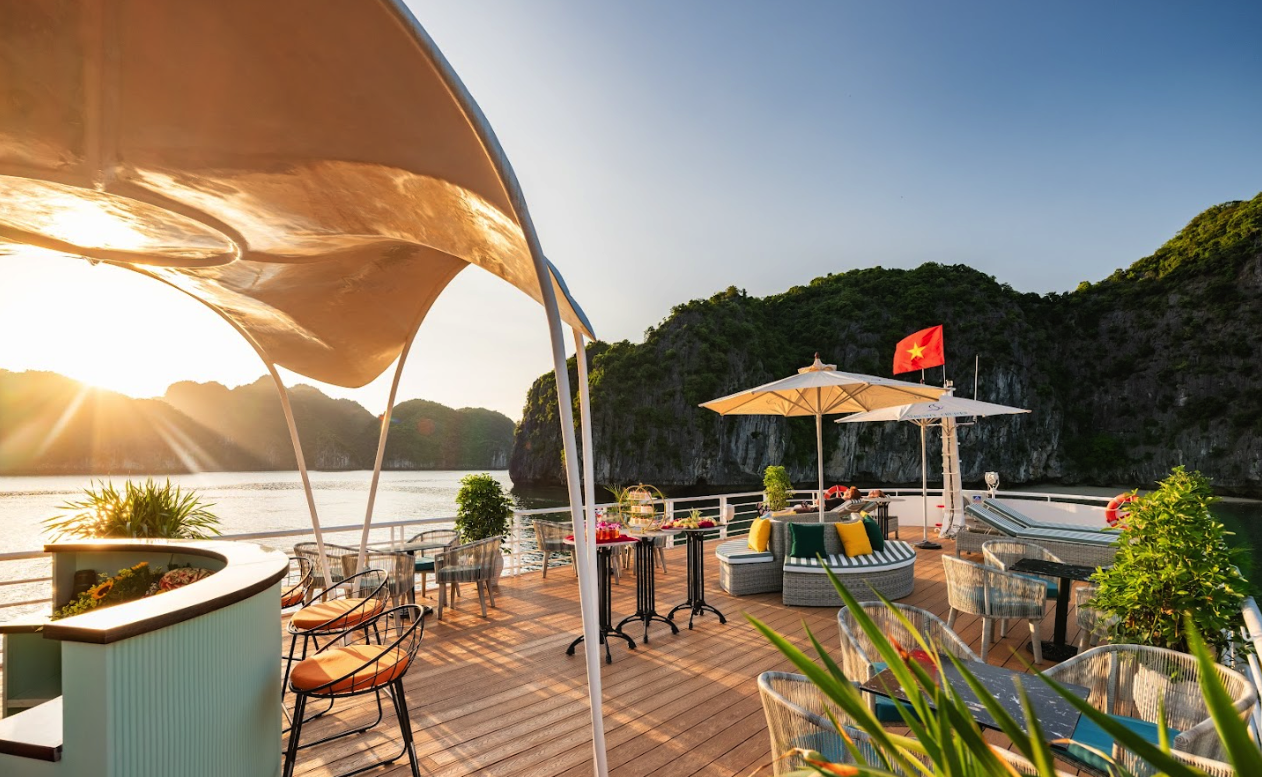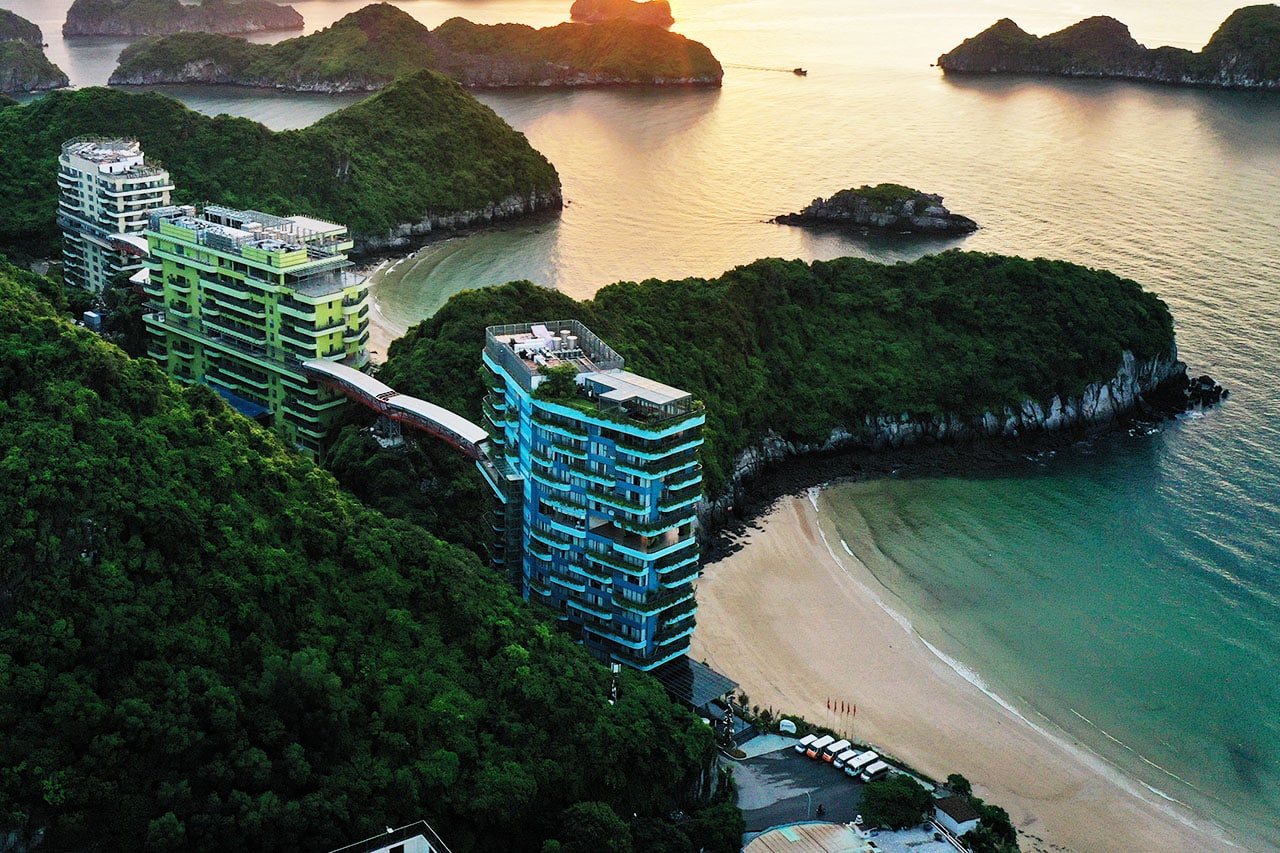Jumping straight from the deck into the cool, clear waters, pedaling through the peaceful trails of Viet Hai Village, and strolling through the bustling lanes of the largest fishing village in ASEAN—sounds like a dream, right? Well, it’s all possible in Lan Ha Bay. While many travelers flock to the renowned Halong Bay, I’ve found myself drawn to the quieter, equally stunning Lan Ha Bay.
Why consider Lan Ha Bay as an alternative to Halong Bay, you might ask? Both spots boast incredible landscapes and turquoise waters that look like they’ve been lifted from a postcard. But if you’re anything like me, seeking places where you can feel a connection to nature without elbowing through crowds, you’ll find Lan Ha Bay offers a different, perhaps more intimate, charm.

So, let’s dive deeper and see what makes Lan Ha Bay stand out from its famous neighbor, Halong Bay. Could this less-visited bay be the tranquil escape you’ve been looking for? Let’s find out together.
1. Overview of Lan Ha Bay
Lan Ha Bay, a serene neighbor to the bustling Halong Bay, offers a quieter escape with its 70 square kilometers and about 400 limestone islands—far fewer than Halong’s nearly 2,000. This smaller size means fewer visitors and a more intimate experience with nature. It is one of the world’s most beautiful bays, its charm lies in its wild and uniquely shaped limestone landscapes, accessible through a less crowded boat tour.
The bay is also home to 139 secluded sandy beaches nestled between rugged cliffs, providing perfect spots for swimming in clear blue waters or simply relaxing away from the crowds. Whether you’re exploring its mystical islands or enjoying a quiet beach day, Lan Ha Bay is an idyllic alternative to the more tourist-heavy Halong Bay.

If you’re trying to decide between Lan Ha Bay and Halong Bay for your next escape, here’s why the quieter, more untouched Lan Ha Bay might just capture your heart.
a. Pristine Environment and Fewer Tourists
Lan Ha Bay isn’t just less crowded—it’s a world where nature still feels wild and unexplored. Here, you can enjoy pristine landscapes without the hustle and bustle that you might find in Halong Bay. The waters are clearer, the beaches cleaner, and you’re much less likely to bump into large groups of tourists.
Take the ancient Viet Hai village tucked away in the lush hills, where traditional lifestyles flourish away from the tourist trail. Or the untouched beauty of Ba Trai Dao Beach, offering three small, sandy beaches that look like they’ve leaped out of a dream. Not to mention the mysterious Sang Toi Cave, where you can paddle in serene darkness, surrounded by stunning rock formations. These hidden gems provide a tranquility that’s harder to find in the often-busy Halong Bay.

b. Freedom to Explore
Lan Ha Bay’s relatively relaxed regulations mean you can dive off your boat into the blue, paddle a kayak under vast limestone cliffs, and explore at your own pace. This freedom makes it a haven for those who love to adventure without bounds, offering endless opportunities to discover secluded areas without the constraints often found in more regulated tourist spots like Halong Bay.
One of the things I loved most about Lan Ha Bay was the lack of restrictions. I could jump into the sea from my boat whenever the mood struck, which was liberating. Kayaking felt like a personal adventure, especially when I paddled through less known caves and hidden lagoons without a guide or a group of tourists nearby. Biking through Viet Hai was another highlight, where the true beauty of the Vietnamese countryside unfolded around me. This isolated village seemed almost untouched by time. Pedaling past buffalo lazily grazing in the fields, the lush green of the valley, and small local homes was incredibly peaceful, offering a profound sense of connection to this quiet part of the world.

c. Dive into Local Culture
Exploring Lan Ha Bay also means immersing yourself in its rich culture. The floating fishing villages here are vibrant hubs of daily life, offering a peek into the age-old traditions of the sea. These communities are a far cry from the commercial feel in some of Halong Bay’s spots, providing a more authentic experience as you interact with locals whose families have fished these waters for generations.
3. Outdoor Activities Comparison
Kayaking
Kayaking in Lan Ha Bay is a must. With minimal restrictions, you can launch your kayak right from your boat and paddle through tranquil waters, weaving between countless limestone karsts. The bay’s numerous hidden coves and quiet lagoons make for perfect kayaking spots, where the calm waters reflect the sky and cliffs tower overhead.

Swimming
Lan Ha Bay is celebrated for its stunning remote beaches, such as Ba Trai Dao and Van Boi. These spots are not just for lounging on the sand; they are perfect for those looking to immerse themselves in the bay’s natural beauty. Swimming here is an experience not to be missed, with visitors often choosing to jump directly from their boats into the emerald waters.
For a unique experience, you can spend a leisurely afternoon in a floating pool, surrounded by the bay’s panoramic views. However, it’s good to note that swimming at Ba Trai Dao is tide-dependent. During higher tides, the beaches here can be submerged, making swimming impossible.

Trekking and Rock Climbing in Cat Ba National Park
For those looking for a moderate challenge with rewarding views, the trek to Ngu Lam Peak through the Kim Giao forest is a great choice. This route is not only manageable but also incredibly scenic, offering a glimpse into the rich biodiversity of the area. As you walk through the forest, keep an eye out for the unique flora and fauna that make this place so special.
If you’re in the mood for a bit more of a challenge, setting out for Hai Quan Peak is a must. The hike is more demanding but perfectly doable for those with a bit of trekking experience. Reaching the summit rewards you with breathtaking panoramic views of three major bays: Halong Bay, Lan Ha Bay, and Bai Tu Long Bay. The sight from the top is a stunning reward for your efforts, showcasing the vast beauty of the region from an incredible vantage point.

Lan Ha Bay offers some exceptional rock climbing spots, especially around Cat Ba Island. The island’s rugged cliffs provide challenging routes with rewarding views of the bay. Trekking through Cat Ba National Park, you get a mix of dense jungle and panoramic sea views, which is quite the adventure.
Biking in Viet Hai village
Exploring Viet Hai Village by bike is one of the most delightful ways to experience Lan Ha Bay’s quieter side and is an adventure you won’t find in the more tourist-heavy Halong Bay. Nestled in the heart of Cat Ba National Park, this remote village is accessible only by boat, followed by a scenic bike ride. Biking isn’t just about exercise—it’s about immersing yourself in the stunning natural surroundings. You’ll pass lush green fields and see water buffalo lazily grazing by the roadside. The peaceful environment, coupled with the gentle sounds of nature, makes for a truly relaxing outing.
Another unique experience in Viet Hai that you won’t encounter in Halong Bay is the fish foot massage. After a leisurely bike ride, you can dip your feet into a natural pond and let the small fish gently nibble away, providing a natural exfoliation. It’s an unusual but refreshing way to relax and rejuvenate, especially after some active cycling.

Do a cruising trip
Exploring Lan Ha Bay on a cruise is a fantastic way to see this quieter, less crowded alternative to Halong Bay. While it’s not as well-known, more and more cruises are starting to head to Lan Ha Bay from the ports around Halong City. If you’re short on time, a day cruise is a great choice—you’ll get to see the beautiful bay and still have time to wander around Cat Ba town. For those who can stay a bit longer, spending a night on a cruise in Lan Ha Bay is really special. You’ll drift off to sleep under the stars and wake up to the peaceful sight of misty cliffs at dawn. If you prefer staying on land, Cat Ba Island has everything from cozy hostels to luxurious resorts like MGallery and Flamingo, perfect for relaxing after a day of exploring. Whether you’re out on the water or enjoying the island, Lan Ha Bay is a lovely, tranquil spot that’s definitely worth a visit.


4. How to get to Lan Ha Bay
a. From Hanoi to Lan Ha Bay
Reaching Lan Ha Bay is straightforward, with several flexible travel options from Hanoi:
Bus to Cat Ba Island
The most common route involves taking a bus from Hanoi directly to Cat Ba Island. The total journey is about 3.5 hours. This includes two hours from Hanoi to Got Pier on the highway, followed by a quick 10-minute transfer to Cai Vieng Port, and a final 45-minute bus ride from Cai Vieng to Cat Ba town.
Transfers to the Island
Since Cat Ba is an island, you’ll need to choose your type of transfer. Options vary by bus operator and include a ferry, speedboat, or cable car. The ferry ride takes about 20 minutes, while the speedboat and cable car can get you there in just 8 minutes.
If you’re traveling during peak times, like the summer months which are popular with domestic tourists, be prepared for potential congestion. Many locals bring their private vehicles to the island, which can lead to delays, especially on ferries. Choosing a faster transfer like a speedboat or cable car can help avoid some of this congestion.

b. From Hai Phong to Lan Ha Bay
Traveling to Lan Ha Bay from Hai Phong is straightforward and offers several options. Start by taking a bus or taxi to Got Pier, where you can choose between a ferry boat or a speedboat for your crossing to Cai Vieng. The speedboat is faster but may be more expensive than the ferry. Once you arrive at Cai Vieng, you have a few choices for reaching Cat Ba town. You can take a taxi directly to the town for around 400,000 VND per car, which is convenient if you prefer a private ride.
Alternatively, you can catch a tourist bus for about 80,000 VND per person, but keep in mind that it runs on a fixed schedule. For a more budget-friendly option, the local bus runs every hour and charges only 50,000 VND per person, although it may make more stops along the way. Planning your route and understanding the timing and costs of these options will help you have a smoother journey to Lan Ha Bay.
5. Conclusion
Whether you’re planning a day trip or a longer stay, getting to Lan Ha Bay is easier than ever, with straightforward options from both Hanoi and Hai Phong. Remember, the journey is part of the adventure, and each travel choice offers its own unique flavor of the local lifestyle.
So pack your bags, and prepare for an unforgettable experience in Lan Ha Bay, where the charm of Vietnam’s less trodden paths awaits. With fewer crowds, more freedom to explore, and the chance to connect deeply with nature and local traditions, your visit to Lan Ha Bay could be the highlight of your travels.

0 Comment